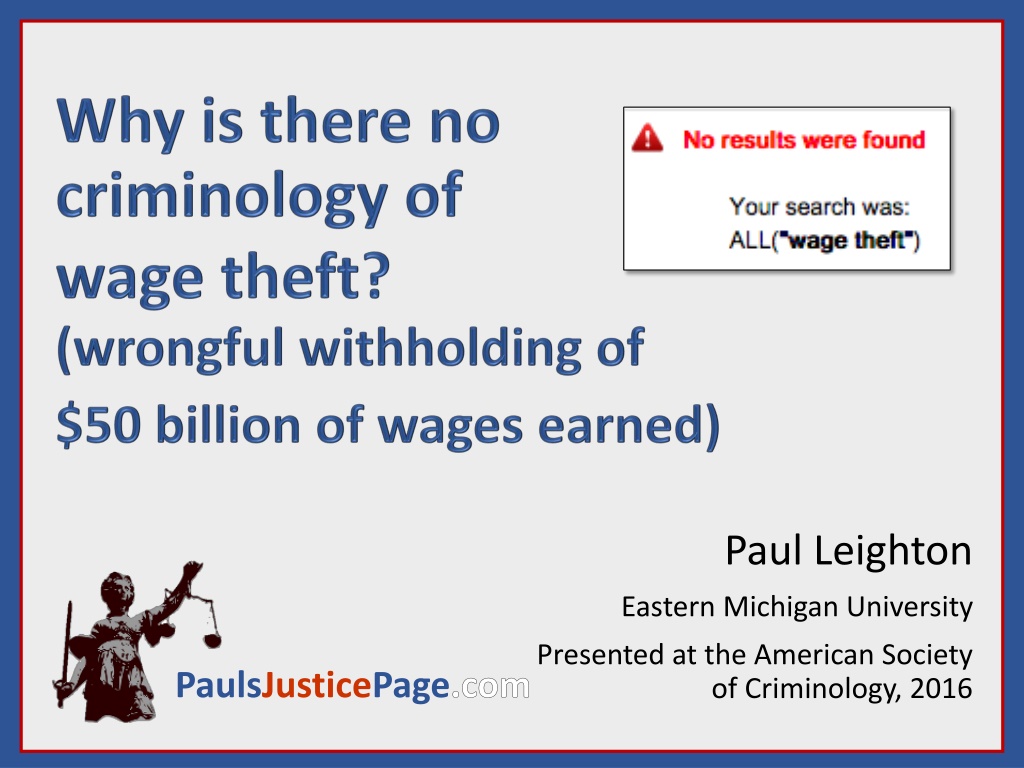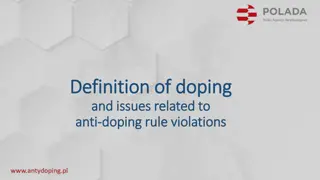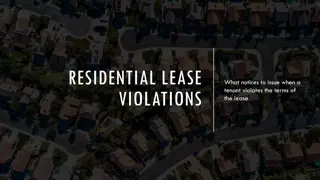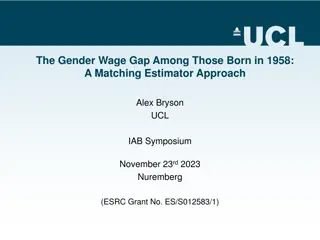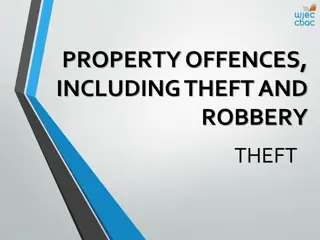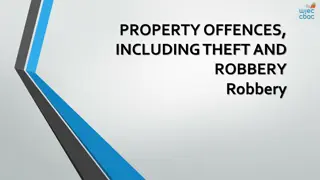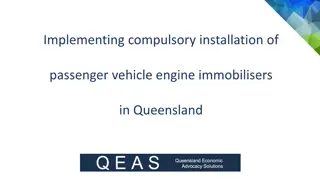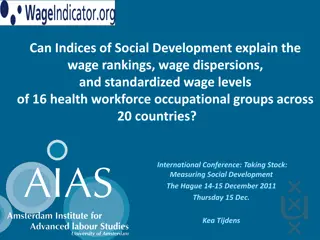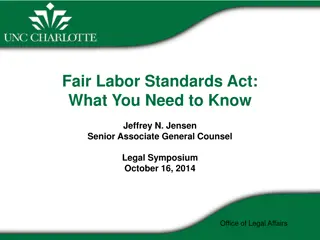Understanding Wage Theft: A Closer Look at Violations and Consequences
Wage theft, a prevalent issue in the labor market, encompasses various violations such as not paying minimum wage, altering breaks, and misclassifying employees. The Fair Labor Standards Act of 1938 addresses these offenses with penalties, including imprisonment for repeat offenders. Studies indicate substantial monetary losses due to wage theft, impacting both low-wage and high-income workers. Awareness and enforcement are crucial in combating this form of exploitation.
Download Presentation

Please find below an Image/Link to download the presentation.
The content on the website is provided AS IS for your information and personal use only. It may not be sold, licensed, or shared on other websites without obtaining consent from the author. Download presentation by click this link. If you encounter any issues during the download, it is possible that the publisher has removed the file from their server.
E N D
Presentation Transcript
Paul Leighton Eastern Michigan University Presented at the American Society of Criminology, 2016 PaulsJusticePage.com PaulsJusticePage.com
Outline 1. Understanding wage theft [wage and hour violations] 2. There is no criminology of wage theft 3. Why there isn t/should be a criminology of wage theft Photo by Heather Mooney 4. Conclusion/call to action PaulsJusticePage.com
Understanding wage theft Fair Labor Standards Act of 1938, 29 U.S.C. 201, et seq Congress finds the existence of labor conditions detrimental to the maintenance of the minimum standard of living necessary for health, efficiency, and general well-being of workers Minimum wage 40 hour workweek w/ overtime at 1.5X regular pay Dept of Labor Wage and Hour Division State and locals laws may go further Can require higher than minimum even a living wage Specification for pay periods, data on paycheck, deductions State Wage and Hour agencies PaulsJusticePage.com
Understanding wage theft Fair Labor Standards Act of 1938: Penalties 6 months in prison for second conviction under the Act (29 USC 216a) And Civil action for wages due + 100% penalty ( 216b) Some state laws also specify imprisonment Inherent in wage theft is fraud with payroll taxes, punishable by up to 5 years in prison 26 USC 7202 PaulsJusticePage.com
Understanding wage theft Types Not paying for all hours worked falsify time card No overtime Fail to pay minimum wage (esp piece work or with tips) Changing paid breaks into unpaid, working through breaks Requiring employees to work before or after shift Violations of donning and doffing [clothes, protective gear] Improper classification of employee as independent contractor Internships with no educational component (takes place of additional salaried employee) Not paying retirement contributions, benefits or payroll taxes PaulsJusticePage.com
Understanding wage theft 2009 study of low wage industries in three major cities found wage theft totaled $3 billion $50 billion loss updates and extrapolates to the rest of the low wage work force [Economic Policy Institute 2014] 2012 almost $1 billion in actual, known recovered wages FBI: losses from all property crime in 2012 = $15.5 billion $50 billion underestimate because wage theft happens to middle and upper income employees PaulsJusticePage.com
No criminology of wage theft PaulsJusticePage.com
No criminology of wage theft No major criminology journal has published an article primarily about wage theft in more than 20 years. Criminology, Justice Quarterly, Journal of Research in Crime and Delinquency, Law and Society Review, Journal of Criminal Law and Criminology, Crime and Delinquency, Criminology and Public Policy, Theoretical Criminology, Criminal Justice and Behavior, Social Justice, Crime, Law, and Social Change, The Journal of Criminal Justice PaulsJusticePage.com
Why there isnt/should be a criminology of wage theft Wage theft is a crime of the powerful the most important things done for good or ill [are] done by corporate rather than individual actors. We cannot proceed as if Sutherland never gave his 1939 Presidential address to the American Sociological Society that brought white collar crime into the English language. Braithwaite, 2003. What s wrong with the sociology of punishment? Theoretical Crim, 7(1): 5-28. PaulsJusticePage.com
Why there isnt/should be a criminology of wage theft Wage theft is about regulation The social control of (natural and corporate) persons requires an understanding of how criminal law mixes with civil law and regulations to create social control. today we live in a world where criminal action is increasingly embedded in organizational action. Braithwaite, 2003. What s wrong with the sociology of punishment? Theoretical Crim, 7(1): 5-28. PaulsJusticePage.com
Why there isnt/should be a criminology of wage theft Criminology programs claim they want to prepare students for the job market just not the exploitation in the workplace Prepare resume, practice presentations, discuss dress and practice interview questions BUT Don t discuss the laws that give them rights over what they earned and how to challenge the theft of their earnings Teaching about wage theft could help empower students PaulsJusticePage.com
Why there isnt/should be a criminology of wage theft Criminology programs claim they want to help students think critically about crime and justice, even expose the injustice of harsh punishments for the poor just not the hypocrisy of a system with little accountability for the powerful Why do some state wage and hour divisions who police business have no investigative power? Why were the wage and hour divisions of several states completely defunded for several years, so that there was no state policing of wage theft? PaulsJusticePage.com
Conclusion: Call for a Criminology of Wage Theft A fair day s pay for a fair day s work Victimology: Mass financial victimizations Can cost individuals a significant % of income, esp stressful when in precarious economic situation Cheat govt out of taxes [reduce services, increase taxes] Competitive advantages to businesses engaged in wage theft, so practice spreads if enforcement is weak Outsource to lowest bidder, so less directly accountable for wage theft that is part of the business model PaulsJusticePage.com
Conclusion: Call for a Criminology of Wage Theft Criminology should study all significant crimes and embrace equal protection under the law. Especially NOT workplace theft means employees stealing, not employers insurance fraud means insurance company victims, not perpetrators credit card fraud means financial institution victims, not predatory and illegal behavior by financial institutions Jock Young notes that at times, criminology is parodying the most conventional prejudices of bourgeois society (in Pearce, Crimes of the Powerful [1976], p 11) PaulsJusticePage.com
Dr. Paul Leighton is a Professor in the Department of Sociology, Anthropology & Criminology at Eastern Michigan University. He is the co-author of The Rich Get Richer and the Poor Get Prison (11th ed, Routledge 2017). He is also co-author of Class, Race, Gender & Crime (4th ed, Rowman and Littlefield, 2013). More information: http://paulsjusticepage.com/paul/pauls-cv.htm See also: PaulsJusticePage.com
